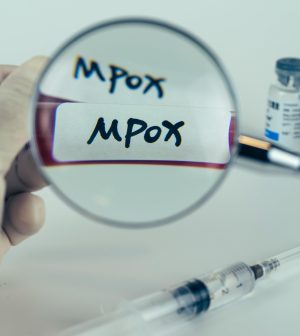- Could Your Grocery Store Meat Be Causing Recurring UTIs?
- Are You Making This Expensive Thermostat Error This Winter?
- Recognizing the Signs of Hypothyroidism
- 10 Strategies to Overcome Insomnia
- Could Artificial Sweeteners Be Aging the Brain Faster?
- Techniques for Soothing Your Nervous System
- Does the Water in Your House Smell Funny? Here’s Why
- Can a Daily Dose of Apple Cider Vinegar Actually Aid Weight Loss?
- 6 Health Beverages That Can Actually Spike Your Blood Sugar
- Treatment Options for Social Anxiety Disorder
Study Confirms Effectiveness of Mpox Vaccine

While it doesn’t prevent infection altogether, new research shows the mpox vaccine does reduces the severity of disease in those who fall ill from the virus.
An international team of scientists found that those people who had either mpox vaccination or a previous infection in 2022 had less severe disease.
The researchers studied 38 mpox infections in 37 gay and bisexual men; among the group were eight reinfections and 30 that occurred after a complete vaccination course.
Patients who had been vaccinated had fewer lesions, less disease of the mucous membranes of the mouth and genitals, and minimal need for pain medication or hospitalization.
Researchers used what is called the Mpox-SSS score to assess symptom severity. The scoring system was developed during the 2022 multi-country outbreak. It is a numerical score given with consideration for number of lesions, the level of care required for the patient, the amount of pain medication needed, the extent of mucosal areas affected, and whether there is any bacterial superinfection.
In those who were reinfected, participants had less severe disease with less need for pain medicine compared to their first infection. Fewer areas of their bodies were affected and recovery was faster. The first infection lasted a median of 21 days. The second infection lasted a median of 15 days.
“This is good news and shows that post-vaccination infections are less severe and the need for hospitalization is lower. This is clear evidence that vaccination is an important tool in reducing morbidity and controlling further outbreaks,” said lead study author Dr. Chloe Orkin, a professor of HIV medicine at Queen Mary University of London.
“We have to ensure global access to vaccinations and treatments if we want to curb this global outbreak, especially in the African regions that have been historically worst affected and are still without access to vaccines or treatment for mpox,” Orkin added in a university news release.
The study was the largest and only case series to examine both reinfections and infections after a complete vaccine course.
More than 87,000 cases of human mpox have been reported since May 2022 in 112 countries. Transmission has primarily been in sexually active gay and bisexual men. It’s spread by skin-to-skin and bodily fluid contact.
Mpox, formerly called monkeypox, causes rashes, fevers and blisters, but can also lead to brain inflammation and seizures. Death rates of up to 27% are seen in a very immunosuppressed group, those with advanced HIV disease.
The findings were published Sept. 4 in The Lancet Infectious Diseases journal.
More information
The U.S. Centers for Disease Control and Prevention has more on mpox.
SOURCE: Queen Mary University of London, news release, Sept. 6, 2023
Source: HealthDay
Copyright © 2026 HealthDay. All rights reserved.










